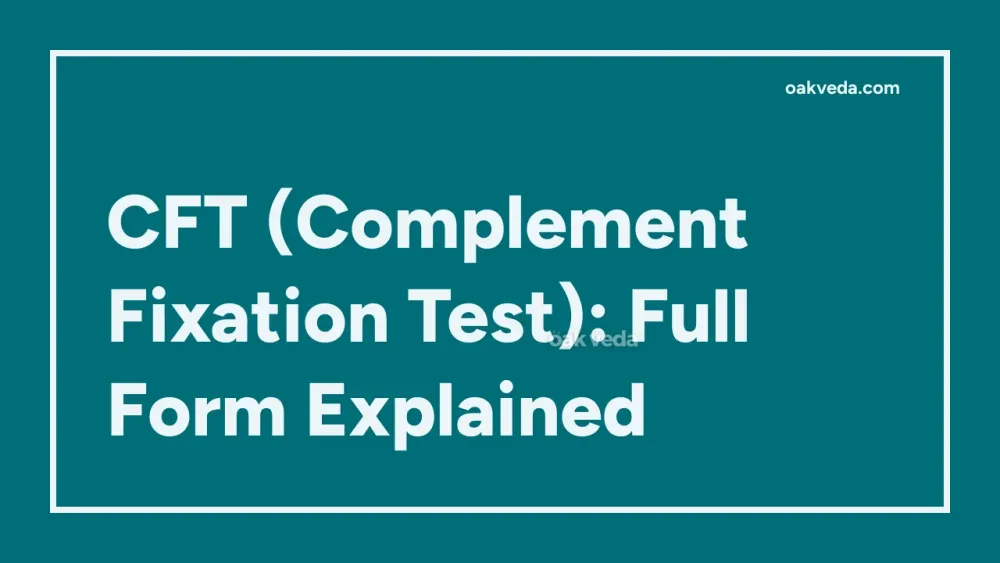
What is the Full Form of CFT?
The full form of CFT is Complement Fixation Test. This diagnostic technique plays a vital role in medical laboratories for detecting specific antibodies in blood serum samples. Understanding the CFT full form is essential for healthcare professionals and researchers working in immunology and infectious diseases.
What is Complement Fixation Test?
The Complement Fixation Test is a serological assay used to identify the presence of specific antibodies or antigens in a patient's blood serum. This test relies on the principle of complement fixation, where the complement system proteins bind to antigen-antibody complexes. CFT is particularly useful in diagnosing various infectious diseases and autoimmune disorders.
Origin and Development of Complement Fixation Test
The Complement Fixation Test has a rich history in medical diagnostics. It was developed in 1909 by August von Wassermann, a German bacteriologist. Initially, the test was primarily used for syphilis serology, revolutionizing the diagnosis of this sexually transmitted infection. Over time, researchers expanded its applications to detect antibodies for a wide range of pathogens and diseases.
How does Complement Fixation Test work?
The Complement Fixation Test operates on a complex yet fascinating principle:
- A patient's serum sample is mixed with a known antigen and complement proteins.
- If specific antibodies are present in the serum, they form antigen-antibody complexes.
- The complement proteins bind to these complexes, becoming "fixed" or consumed.
- Indicator cells (usually sheep red blood cells) and their corresponding antibodies are added.
- If complement proteins remain unbound, they cause lysis (bursting) of the indicator cells.
- The degree of cell lysis is measured to determine the presence or absence of specific antibodies in the patient's serum.
Types of Complement Fixation Tests
While the basic principle remains the same, CFT can be adapted for various purposes:
- Direct CFT: Used to detect antibodies against a specific antigen.
- Indirect CFT: Employed to identify antigens using known antibodies.
- Quantitative CFT: Measures the amount of antibodies present in the serum.
Functions of Complement Fixation Test
The Complement Fixation Test serves several crucial functions in medical diagnostics:
- Antibody Detection: Identifies specific antibodies in patient serum.
- Disease Diagnosis: Aids in diagnosing various infectious and autoimmune diseases.
- Monitoring Disease Progression: Helps track changes in antibody levels over time.
- Epidemiological Studies: Supports research on disease prevalence and spread.
Applications of Complement Fixation Test
CFT finds applications in diagnosing and monitoring various conditions:
- Infectious Diseases: Syphilis, brucellosis, mycoplasma pneumonia, and certain viral infections.
- Autoimmune Disorders: Helps detect autoantibodies in conditions like systemic lupus erythematosus.
- Veterinary Medicine: Used to diagnose infections in animals.
- Research: Supports immunological studies and vaccine development.
Features of Complement Fixation Test
The Complement Fixation Test boasts several notable features:
- Sensitivity: Can detect even low levels of antibodies.
- Specificity: Provides accurate results for targeted antigens or antibodies.
- Versatility: Adaptable for various pathogens and diseases.
- Cost-effectiveness: Relatively inexpensive compared to some modern techniques.
- Batch Processing: Allows simultaneous testing of multiple samples.
Benefits of Complement Fixation Test
Implementing CFT in diagnostic laboratories offers numerous advantages:
- Broad Spectrum Detection: Can simultaneously detect antibodies against multiple pathogens.
- Early Diagnosis: Enables timely identification of infections and autoimmune conditions.
- Treatment Monitoring: Helps assess the effectiveness of therapies by tracking antibody levels.
- Epidemiological Insights: Supports public health efforts by providing data on disease prevalence.
- Historical Continuity: Allows comparison with decades of existing data and research.
Limitations or Challenges of Complement Fixation Test
Despite its benefits, CFT does have some limitations:
- Complexity: Requires skilled technicians and careful standardization.
- Time-consuming: The procedure involves multiple steps and incubation periods.
- Cross-reactivity: Some antigens may produce false-positive results due to similarities.
- Sensitivity Issues: May not detect very recent infections before antibody production.
- Modernization: Newer techniques like ELISA are sometimes preferred for their simplicity and automation.
Future Developments in Complement Fixation Test Technology
While CFT is a well-established technique, researchers continue to explore improvements:
- Automation: Developing systems to automate parts of the CFT process.
- Enhanced Specificity: Refining antigens and protocols to reduce cross-reactivity.
- Multiplexing: Exploring ways to test for multiple antibodies in a single assay.
- Integration with Modern Techniques: Combining CFT principles with newer technologies for improved accuracy and efficiency.
FAQs on CFT Full Form
-
What does CFT stand for in medical terms? CFT stands for Complement Fixation Test in medical terminology.
-
Is CFT still used in modern laboratories? Yes, CFT is still used in many laboratories, especially for certain diseases where it remains a gold standard test.
-
How long does it take to get CFT results? Typically, CFT results are available within 24-48 hours, depending on the laboratory's workflow.
-
Can CFT detect all types of antibodies? CFT is primarily used for detecting certain types of antibodies, particularly those that can fix complement. It may not detect all antibody classes.
-
Is CFT more accurate than ELISA? Both tests have their strengths. CFT is highly specific but can be less sensitive than ELISA for some applications. The choice depends on the specific diagnostic needs.
Understanding the full form of CFT and its applications is crucial for anyone involved in medical diagnostics or immunology research. As we continue to battle infectious diseases and autoimmune disorders, the Complement Fixation Test remains a valuable tool in our diagnostic arsenal.
You may be interested in:
- USP (Unique Selling Proposition): Full Form Explained
- CPU (Central Processing Unit): Full Form and Function
- ASEAN (Association of Southeast Asian Nations)
- ICWA (Indian Child Welfare Act): Full Form Explained
- TT (Tetanus Toxoid): Full Form and Importance
- PNB (Punjab National Bank): Full Form and Overview

